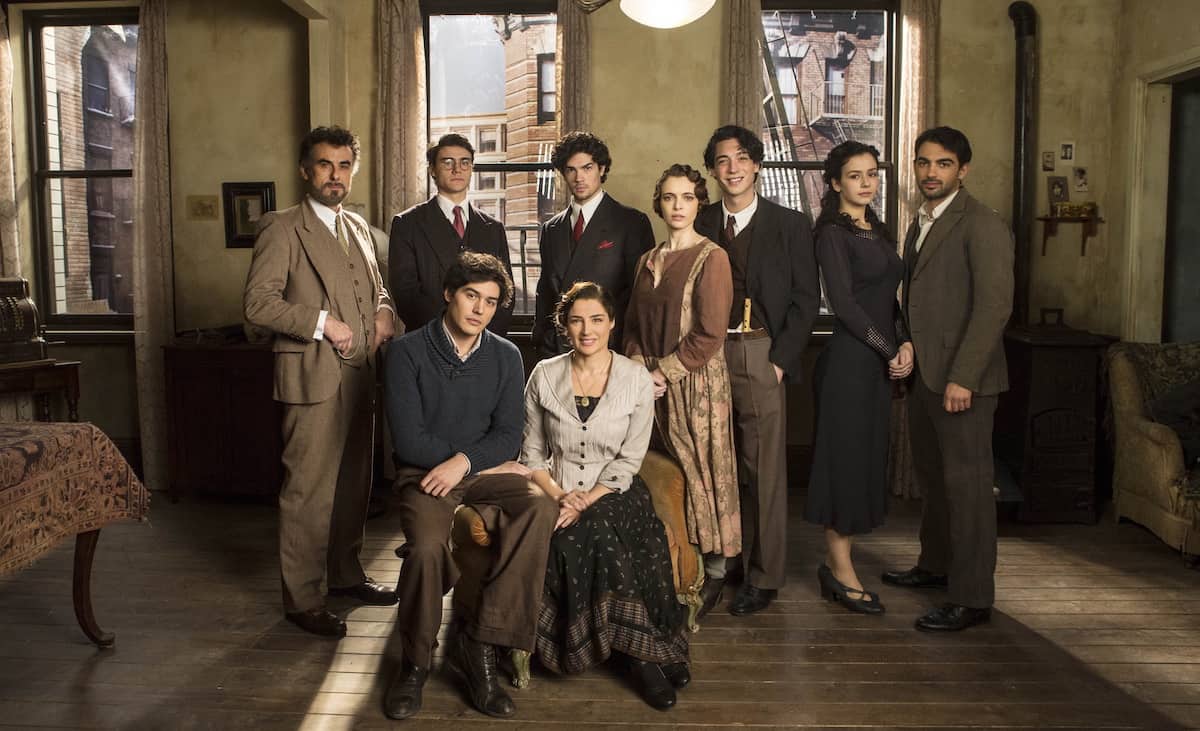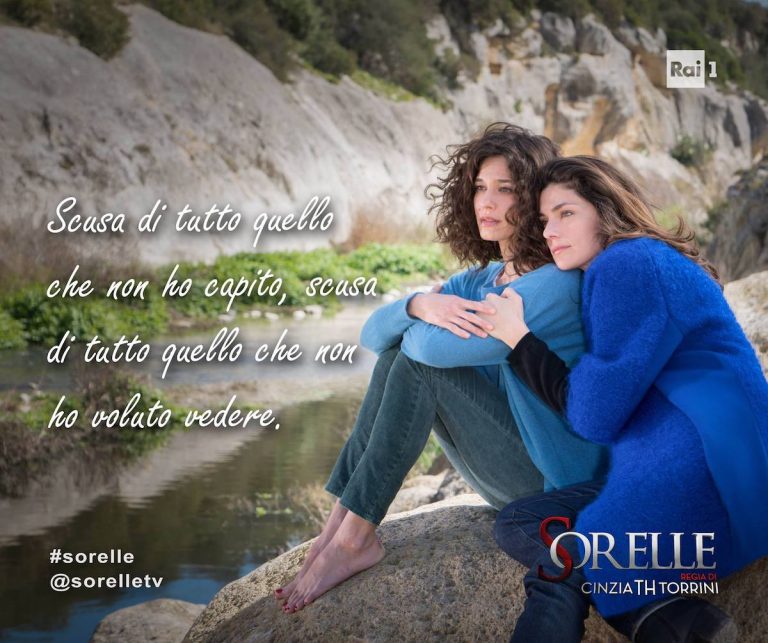The Promised Life: TV Series Looks At Italian Immigrant Experience

The Promised Life (La Vita Promessa) is an Italian period drama that begins in Sicily in 1921 when the region was extremely impoverished, much like the rest of Italy after World War I.
The series transports viewers from Sicily to Naples to New York City (with some flashbacks) during the time when waves of Italian immigrants were arriving on American shores. It offers a window into Italian life and culture both in Italy and the U.S. during those tumultuous times.
Main characters of The Promised Life: La famiglia

The protagonist of the story, Carmela Carrizzo (superbly acted by Luisa Ranieri), is a peasant mother working the fields under a brutal Mafia don, Vincenzo Spano (played by Francesco Arca).
Fans of Detective Montalbano may be surprised to learn that the very talented Ranieri, who appeared in the American romantic comedy, Letters to Juliet, is the wife of Luca Zingaretti, who played the title role in Montalbano.
The don is obsessed with Carmela’s beauty and as the field guard overseeing her work, feels entitled to have her, despite the fact that she is married with four sons—Michele (played by Cristiano Caccamo), Antonio (Giuseppe Spata), Rocco (Emilio Fallarino), and Alfredo (Vittorio Magazzù )—and a daughter, Maria (Francesca Di Maggio).
Throughout the saga, the ensemble cast, the Carrizzo family, is surrounded by excellent supporting actors.
Escaping the gangs of Sicily

To punish Carmela for rejecting his aggressive sexual advances, Spano and his men take revenge on her son Rocco, whom they see eating a lamb bone in the field when he should be working. Although the lamb fell to its death from a rock, they accuse him of slaughtering the animal for food. He is beaten, tortured, and branded as a thief by Spano’s men, leading Rocco to attempt suicide.
Carmela finds and saves her son but the teenager suffers severe brain damage and is never the same. Having the mental faculties of a child, he becomes a lifelong caregiving burden to the Carrizzos.
Carmela’s husband, Salvatore (played by Marco Foschi), a fighter for worker’s rights, seeks to avenge the horrible tragedy that has beset the family. In a confrontation, he is shot in the back and killed by Spano.
The route from Naples to Little Italy
A kind priest, Father Cosimo, warns the widow that she and her family must flee to America to escape the grip of the don and the Sicilian Mafia. He gives her some money and uses his contacts to help her.
Conflicted about leaving her homeland, Carmela realizes she has no choice if she and her family are to have a normal life and a future worth living. They take a horse-drawn carriage with their meager belongings to meet the train that will take them to a refuge in Naples. She feels it is the only way to protect her children from Spano.
The priest arranges a safe haven for the family in the home of a Neapolitan prostitute. Another priest, Father Ignazio, officiates at a wedding by proxy for Carmela that will later allow her and her offspring to emigrate to America.
Looking for Holiday Gifts for Italian Friends or Family? Check our some of our favorites!
Arriving in the “promised land” for a promised life

Carmela quickly learns that the streets in America aren’t paved with proverbial gold.
The Promised Life depicts the challenges Carmela and many other Italian immigrants faced arriving through Ellis Island without adequate housing, jobs, or resources, often not speaking the language or knowing how to read.
Some common themes emerge through the series:
- The strength of family ties among southern Italians, especially in the face of adversity. The matriarch, Carmela, will do anything to help her children survive, including arranging a proxy marriage for her disabled son;
- The corruption and lawlessness immigrants faced in Little Italy where crime syndicates, gangs, and extortion rackets like the Black Hand (immigrants themselves from Sicily and Calabria) controlled the streets and businesses;
- The pivotal role of the Catholic church in offering hope and sustenance to the poor;
- The subjugation of women and limited opportunities for them, even those eager to study and work. One telling moment is when an immigrant Italian prostitute in New York is told to “keep her mouth shut and legs open.”
- At the cusp of The Great Depression, labor conflicts between workers and factory owners caused the former to band together in unions to fight for better salaries and working conditions;
- The significance of kindness and friendship in easing woes. Carmela is blessed to meet a successful businessman, Mr. Amadeo Ferri (played by Thomas Trabacchi), while working as a laundress to earn money on the ship during the crossing. An early immigrant from the north of Italy, he becomes a guardian angel to the beleaguered family and a mentor to her youngest son, Alfredo.
Carmela’s life is rife with drama and tragedy even in New York as the matriarch tries to shield her family from crime, corruption, and other dangers in Little Italy, not totally dissimilar to the terrors they faced in Sicily.
The gripping series is filled with passion, lust, infidelity, and romance, and stories of women who aren’t able to love who they want to love on their own terms.
The costuming and sets are evocative and realistic, think horses before cars in Sicily, and speakeasies and social clubs in lower Manhattan. The musical theme, the haunting 1920 melody Amapola, helps set the mood.
It is estimated that more than four million Italians immigrated to the U.S. between 1880 and 1924. While the drama and violence of the Carrizzo immigrant experience are unlikely to mirror the experience of most other Italian families, many elements will resonate and be recognizable.
Where to watch The Promised Life
Directed by Ricky Tognazzi, Season 1 originally premiered on Rai 1, the state-owned TV station In Italy, in late 2018. Filmed in Italian and subtitled in English, Season 1 has five episodes, each about 1¾ hours long. (Fooled me but the scenes depicting life in Sicily were actually filmed in Puglia; the ones from Little Italy in Bulgaria).
The Promised Life (La Vita Promessa) premiered on MHz Choice, one episode per week, beginning on November 16, 2021; The Promised Life Season 2 will premiere on December 14, 2021.
View The Promised Life Season 1 trailer depicts the first time Carmela and Mr. Ferri meet
Listen to the Soundtrack of The Promised Life on Amazon Music
Disclosure: I am a participant in the Amazon Services LLC Associates Program, an affiliate advertising program designed to provide a means for sites to earn advertising fees by advertising and linking to Amazon.com at no additional cost to you.
If you are looking for “lighter fare,” I highly recommend the irreverent comedy series, Vita da Carlo, on Amazon Prime.
Read more
Other Binge-Worthy TV Series That Transport Viewers to Italy
- My House Is Full of Mirrors (with Sophia Loren)
- The Bastards of Pizzofalcone
- Savoring the Flavors of the Aosta Valley on Le Petit Tour
- The Children of Selvino
- The War Is Over
- A Virtual Trip to Matera with Imma Tataranni
- Watching Detective Montalbano: A Pandemic Escape for Italophiles
- TV Biopic Brings Luisa Spagnoli Story To Life






This sounds fabu- a must-see!